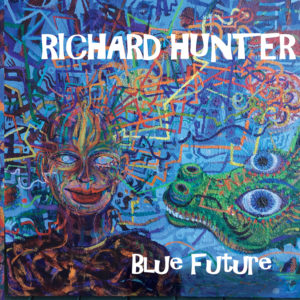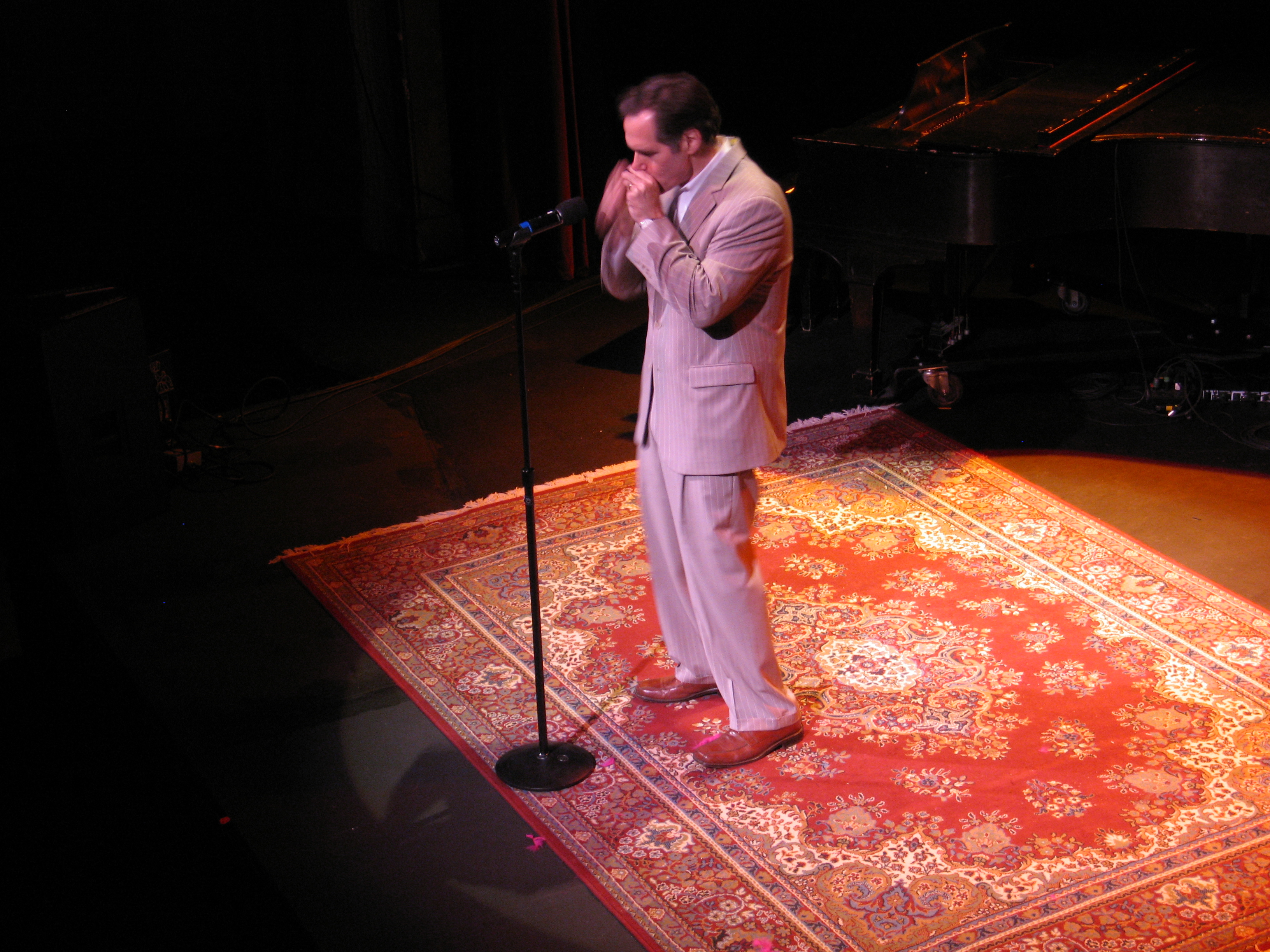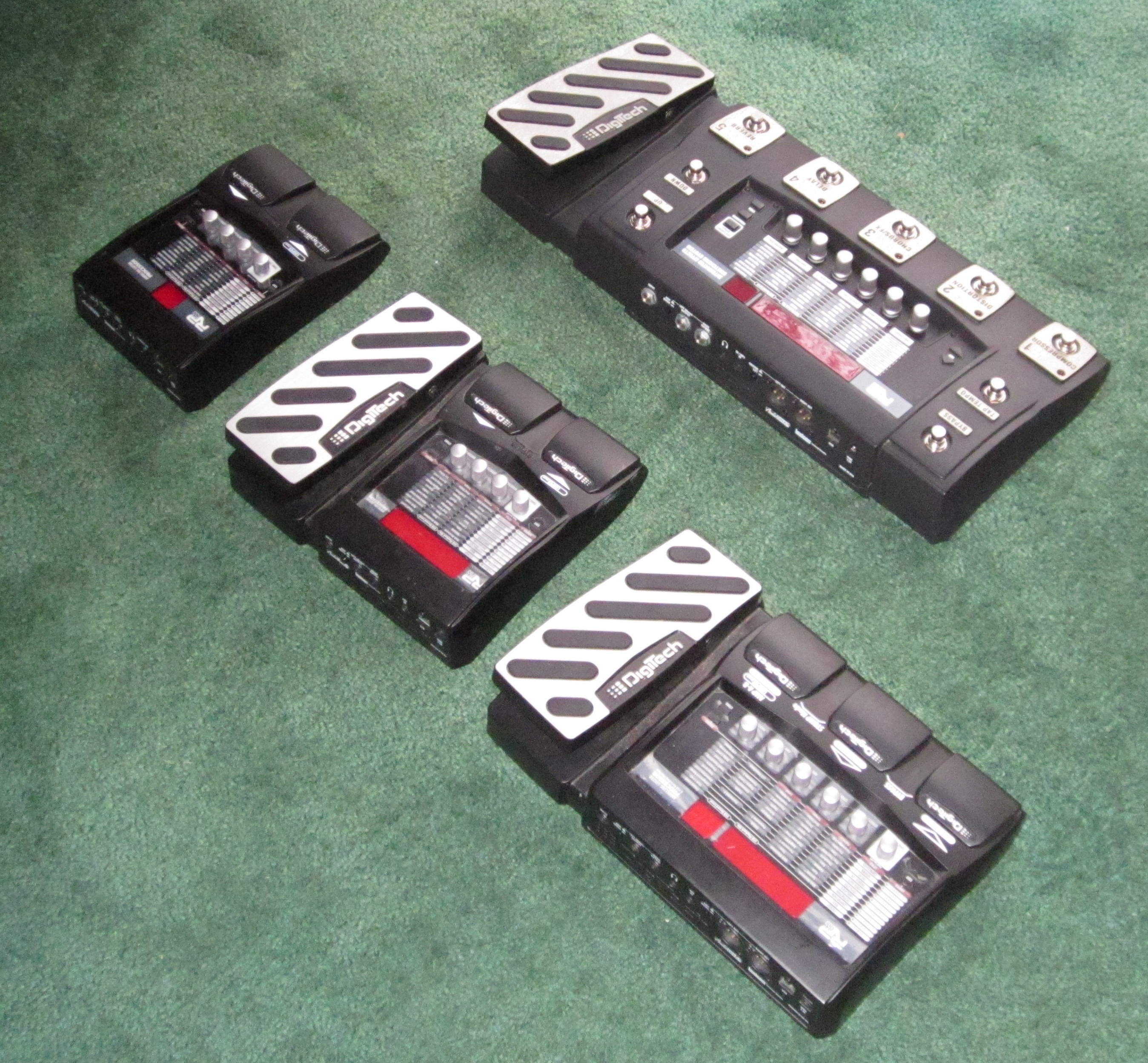
Prices for used (and some new) Digitech RPs are still dropping
I visited eBay and guitarcenter.com today to take a look at the prices for used Digitech RPs. The only harp-friendly RPs still in production include the RP500, 1000, and 360/360XP. But plenty of used RP150/155/250/255/350/355s are out there in good-to-great condition, sounding every bit as good as the day they left the factory, with years of performance-ready life in them in most cases. Those used devices are a great resource for cost-conscious players who want to augment their rigs or build a new one.
As Low As it Goes
At this point used prices for used Digitech RP150/155s on guitarcenter.com are in the neighborhood of $40-50. Interestingly, RP255s, which have a much bigger display, more amp, cabinet, and FX models than the 155, and an expression pedal to boot are selling within that price range, meaning that until prices drop some more there’s little reason to economize by buying a 150/155 instead of a 255. The expression pedal alone makes the RP255 a much more desirable device if you anticipate ever needing a volume pedal, want to use the rotating speaker model in the RP to emulate an organ, or want to put the level of an effect like a pitch shift or delay under foot control. The extra amp models include some Fender types that are highly prized by harp players, with cabinet models to match.
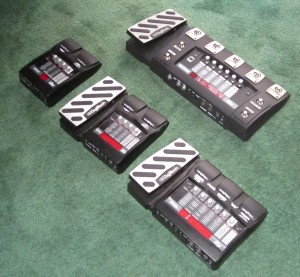
RP350/355s are worth the extra (short) money
RP350/355s are selling in the range of $80 now, and the extra $30 or so is not a lot to pay for the amp, cab, and FX models in those devices. These include some great amp models like the Digitech BlackBass–a combination of a modeled Blackface Deluxe Reverb preamp with a Bassman amplifier section–and killer FX like the FX25 envelope filter, which works very well with harmonica. They also offer more slots for customized sounds than the lower-end devices, and that can be very useful when you’re laying out patches for a set.
The Top of the Line
It’s surprising to me that prices for used RP500s are now as low as $90, and in most cases not higher than $130. This device is by far my favorite RP, with a fantastic set of performance features that include dedicated on/off footswitches for compression, distortion, mod FX, reverb, and delay, plus a footswitch for setting delay time via tap tempo, plus even more killer amp models, including the made-for-blues Gibson GA40 amp and cab models. Unless space onstage or in your backpack is at a premium, at $100 this is the one I’d go for every time.
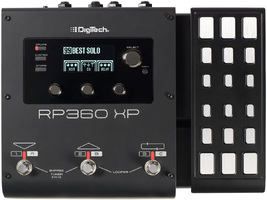
RP360/360XPs are surprisingly inexpensive
It’s also surprising to see that prices for used AND new RP360/360XPs have dropped substantially. New RP360XPs–the one with the expression pedal, and therefore the one I strongly recommend–are down to around $160, and used ones are going at around $100-125. This pedal sounds every bit as good and better as the RP500/1000, but the Nexus software Digitech supplies for creating, saving, and loading patches is greatly inferior to the Xedit application that ships with its closest competitor, the RP500. (To some extent this is offset by the ease of programming the 360XP from its front panel.) Further, the 500’s dedicated footswitches make setup and performance much easier than the RP360XP, where you have to program (and remember) which switches turn which FX on and off for every patch you create.
That said, the sound of this device is indeed topnotch, and it offers flexibility that the 500 and 1000 don’t in that you can lay out a patch with one (but only one) of any kind of effect the device offers in any order you like. (All the other RPs have a fixed position in the signal chain for each type of effect, and you can’t change the order of FX in the chain.) If you want all the various amp and FX models in the R500/1000 in a smaller package, and you don’t need all the realtime control over FX that you get on the 500, the 360XP will work very well for you.
RP1000s are less pricey, but they’re still overkill for harp players
RP1000s are selling used now in the range of $250-300, which is certainly a steep discount from new. In my opinion this device is overkill compared to the RP500, especially where harp players are concerned. The much higher price is justified by hardware features that include an array of ten (as opposed to the RP500’s five) footswitches, an external FX loop, and an external amplifier loop (so you can run a different amp through the 1000’s output, switching back and forth between the two with a footswitch press). I have never felt the need to use any of those features, but maybe that’s just me. (I really do not much understand why I would want to bring an external amp onstage when there are dozens of amp models in the RP. But of course every amp has its own sound, and I can see where nothing else would do for a particular song.) If you’re not interested in those features, the RP500 gives you everything the 1000 has except the extra five footswitches at a much lower price and an increase in portability. (When you’re lugging something, weight=pain.)
What to Avoid Even If It’s Dirt Cheap
I see RP50s, 70s, and 90s out there selling for $20 and up. Harmonica players should never consider those devices, no matter how cheap they get. They do not contain the amp models that harmonica players want the most, and they are not based on the latest generation Digitech chips, so have inferior sound quality (which is especially and painfully obvious on the reverbs in particular). Further, they have no USB connectors, so you can’t use the computer to save and restore your customized sounds if something happens to the device. (Which it can. I fried an RP255 by accident once, and if I’d never backed up those sounds I would have had to put in many hours as well as money to replace and restore it in my rig.)
RP100s/200s/300s are selling for $20 and up too. Their amp models and FX are much more harmonica-friendly than the cheapo RPs above. However, they don’t include a USB interface to your computer, so you can’t use them as an audio interface for recording to your computer. (Every RP from the 150 on up has one of those, and it’s a perfectly usable audio interface for recording harmonica parts in particular.) The lack of a USB interface also means you can’t use your computer to program, back up, and restore the device. Finally, like the other cheapos, they’re based on an older chip, so they don’t have the sound quality of the RP150 and up. That said, if someone offers you an RP200 for a price you can’t refuse, we sell a patch set for it (on paper–you’ll have to enter the data by hand). We wouldn’t bother with an RP100 even if we were paid to take it.
Zoom G3s Are Getting Cheaper, Too
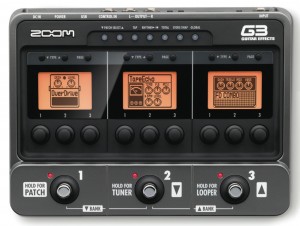
In any case, we’re thinking about doing a patch set for the G3N, but don’t let that stop you if find a G3 in good condition for a good price.
In the meantime, check out our latest record “The Lucky One,” all harmonica tones recorded with the Digitech RP500.
If you liked that, you’ll like these:
the 21st century blues harmonica manifesto in sound
Get it on Amazon
Get it on iTunes
the rock harmonica masterpiece
Get it on Amazon
Get it on iTunes
Tags In
Related Posts
Leave a Reply
You must be logged in to post a comment.
WHAT’S NEW
Categories
- Audio/Video
- Blog
- Blue Future
- Digitech RP Tricks and Tips
- Discography, CDs, Projects, Info, Notes
- Featured Video
- For the Beginner
- Gallery
- Hunter's Effects
- Hunter's Music
- Huntersounds for Fender Mustang
- Meet the Pros
- More Video
- MPH: Maw/Preston/Hunter
- My Three Big Contributions
- Player's Resources
- Pro Tips & Techniques
- Recommended Artists & Recordings
- Recommended Gear
- Recorded Performances
- Reviews, Interviews, Testimonials
- The Lucky One
- Uncategorized
- Upcoming Performances
- Zoom G3 Tips and Tricks
